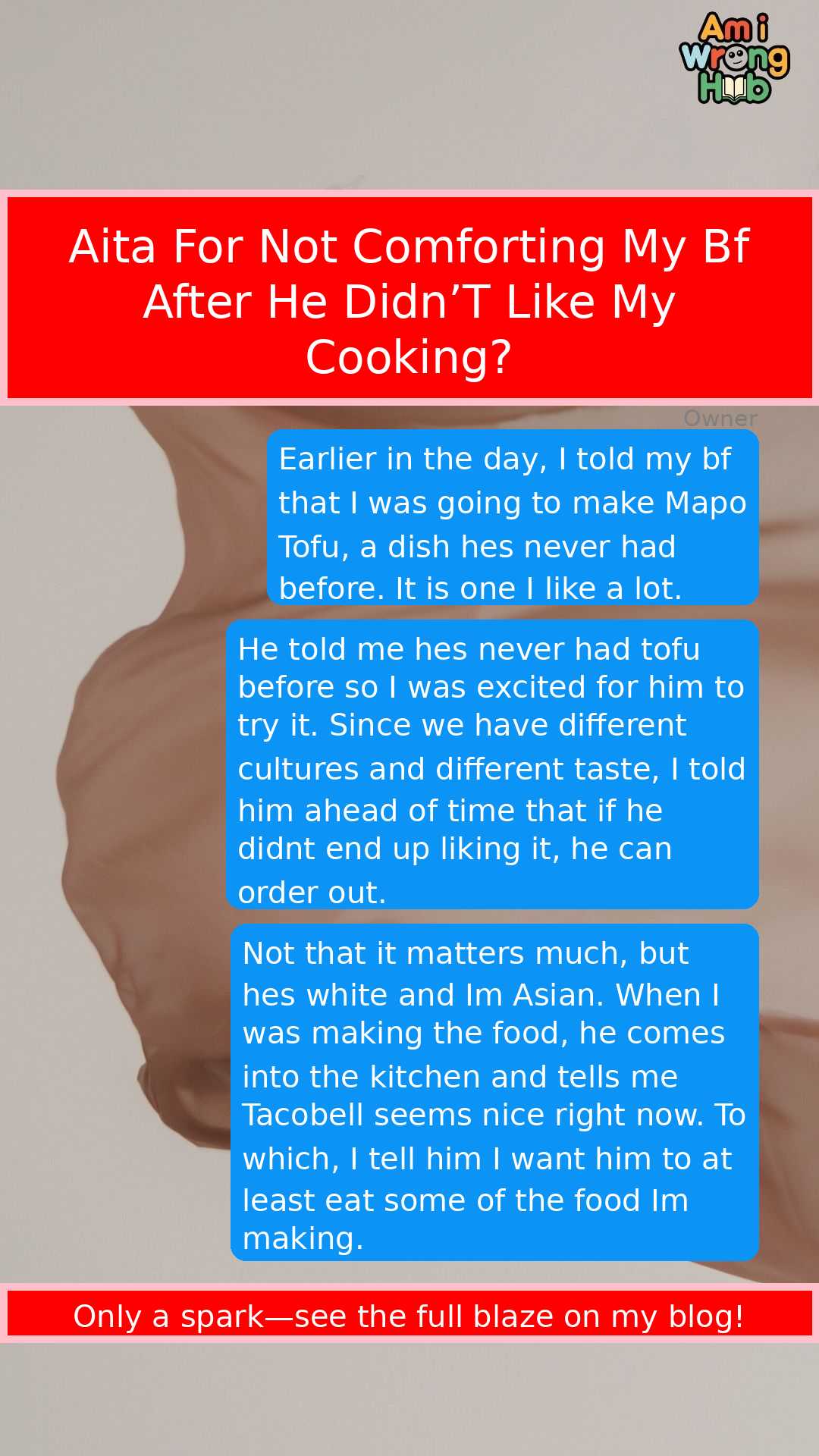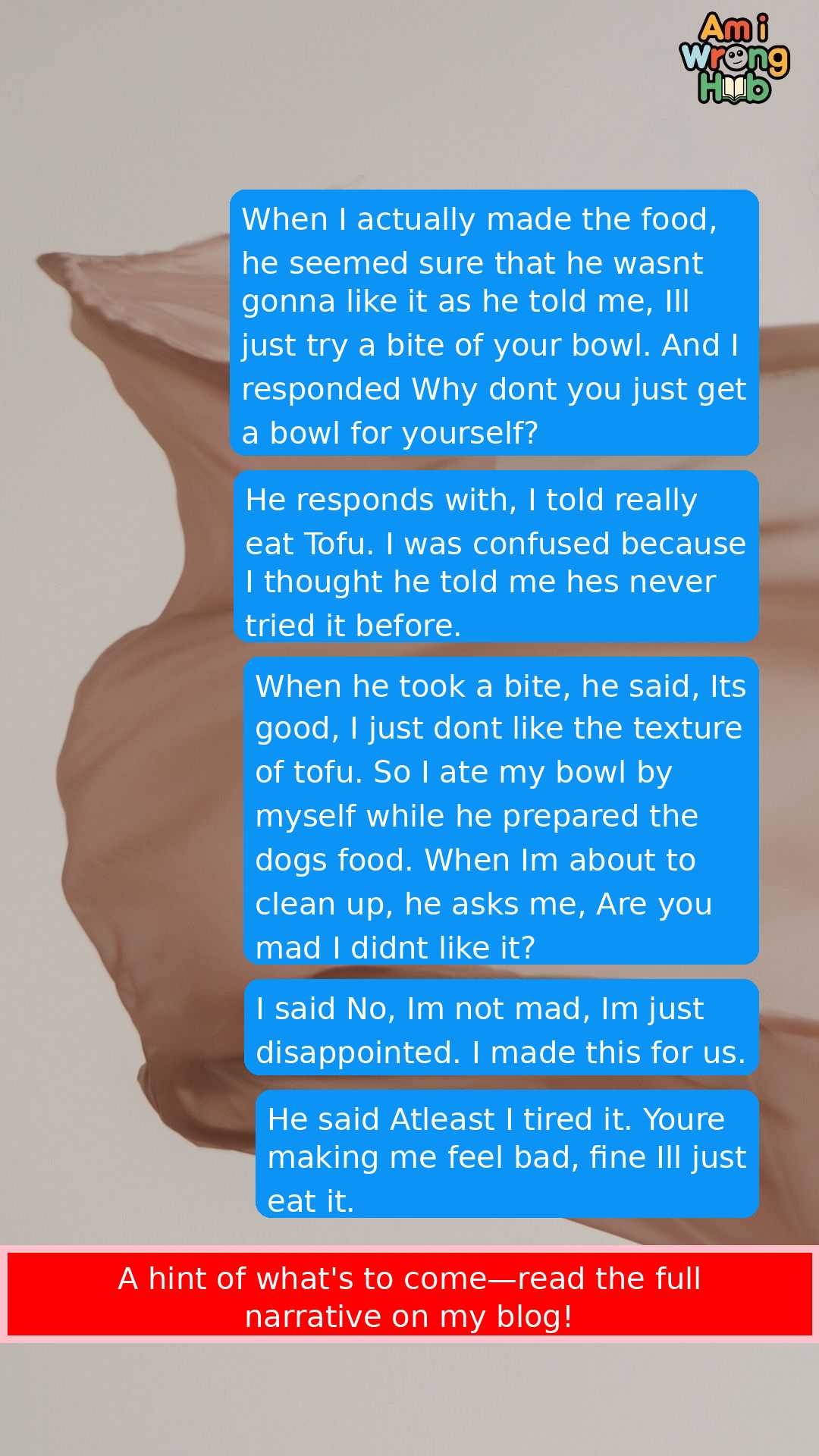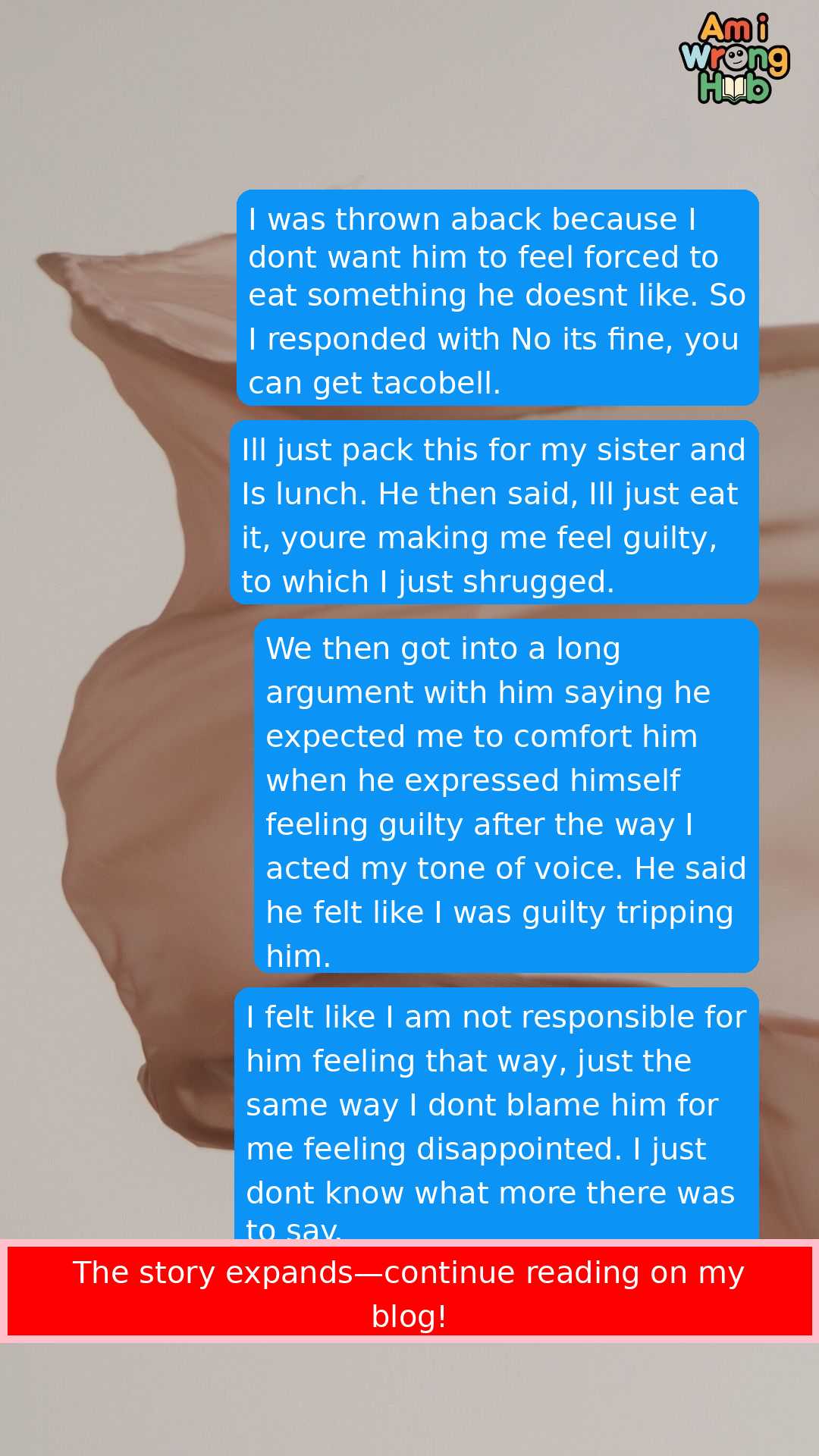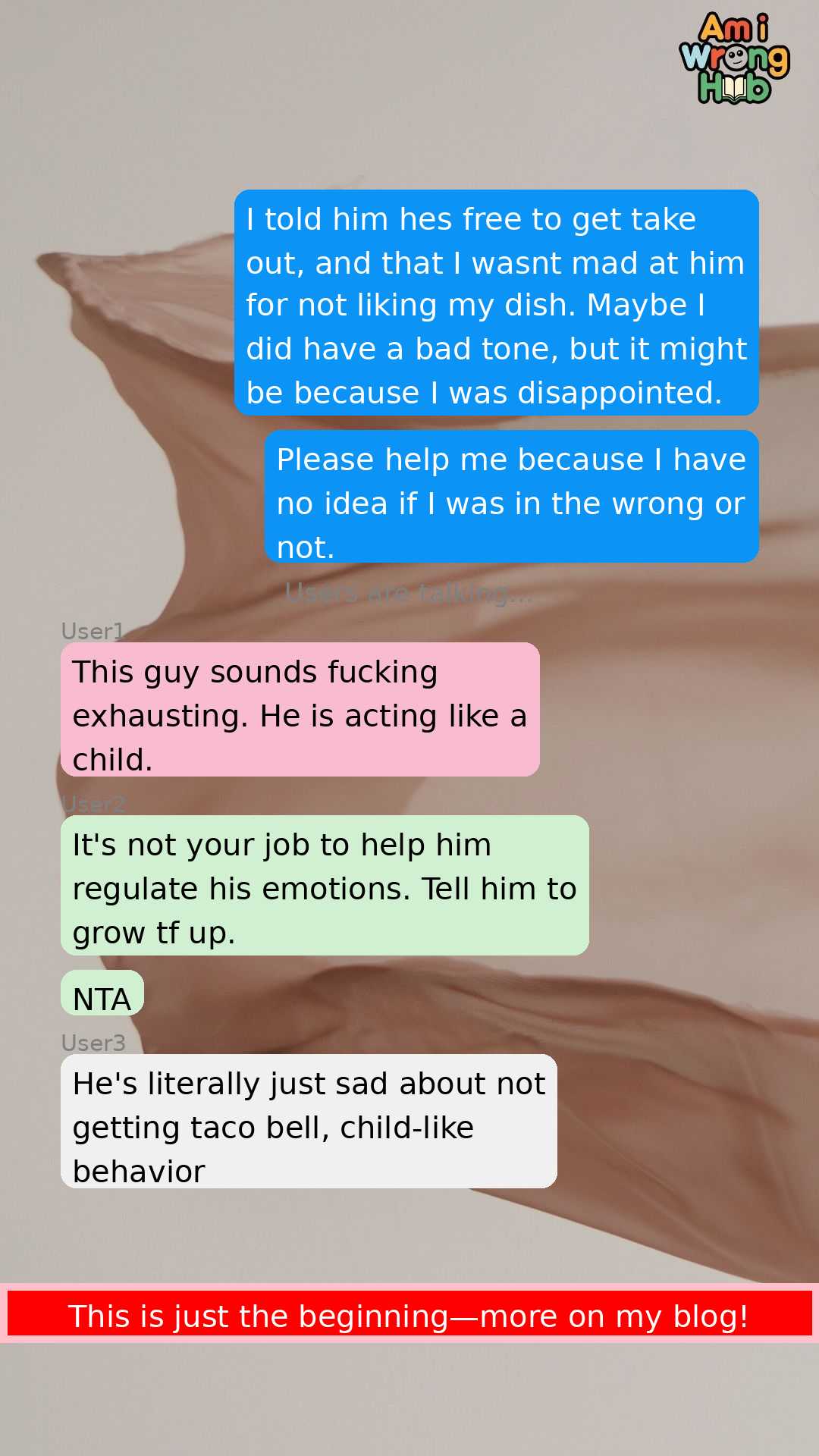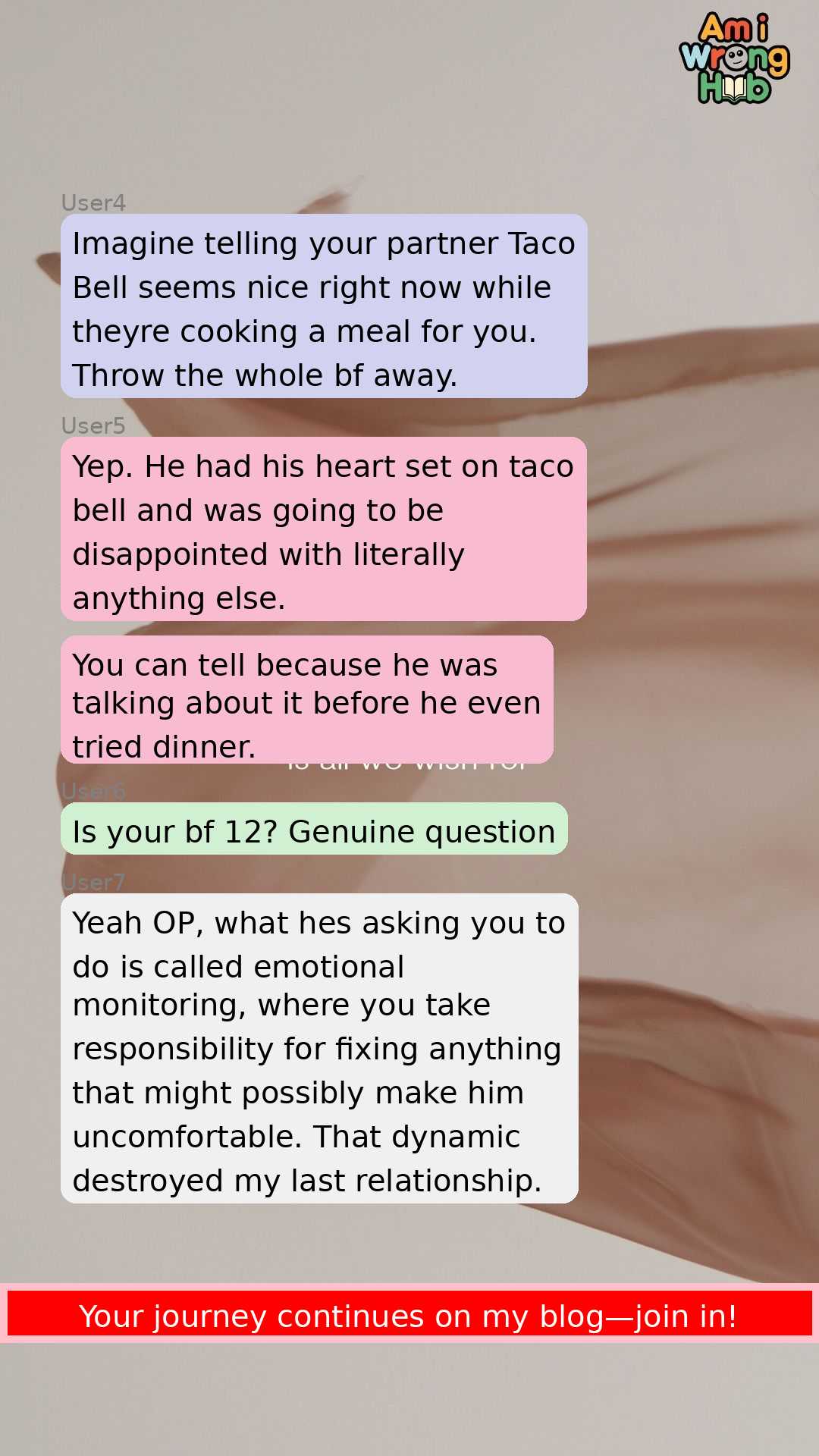AITA for not comforting my bf after he didn’t like my cooking?
 Image credit: Pixabay (This is example image – Not the actual photo)
Image credit: Pixabay (This is example image – Not the actual photo)
AITA for Being Disappointed When My Boyfriend Didn’t Like My Cooking?
In a culturally diverse relationship, one partner excitedly prepares a beloved dish, Mapo Tofu, for the other, who has never tried tofu before. However, when the boyfriend expresses his preference for fast food instead, tensions rise as feelings of disappointment and guilt surface. The situation escalates into a heated argument about expectations and emotional responses, leaving both partners questioning their actions and intentions. This relatable story highlights the complexities of communication and cultural differences in relationships, making readers reflect on their own experiences with food and emotional support.
Family Drama Over Dinner: A Conflict Resolution Dilemma
In a recent dinner scenario, a couple faced unexpected tension over a cultural dish, leading to a conflict that highlighted their differing backgrounds and expectations. Here’s a breakdown of the events:
- Dish Preparation: The narrator, who identifies as Asian, decided to make Mapo Tofu, a dish she enjoys and wanted her boyfriend, who is white, to try for the first time.
- Communication: Prior to cooking, she informed him that if he didn’t like the dish, he could order takeout. This was meant to ease any pressure he might feel about trying something new.
- Initial Reaction: As she cooked, her boyfriend expressed a desire for Taco Bell instead, which prompted her to encourage him to at least try the Mapo Tofu.
- Reluctance to Try: When he finally tasted the dish, he admitted that while it was good, he didn’t like the texture of the tofu. This led to the narrator eating her meal alone while he prepared food for their dogs.
- Feelings of Disappointment: After the meal, he asked if she was upset that he didn’t enjoy the dish. She expressed disappointment, stating she had made it for both of them.
- Escalation of Tension: The boyfriend felt guilty and accused her of making him feel bad about not liking the food. This led to a heated argument where he claimed she was guilt-tripping him.
- Clarification of Intent: The narrator insisted she wasn’t mad and reiterated that he was free to order takeout. She acknowledged that her tone might have reflected her disappointment but felt it was not her responsibility to manage his feelings of guilt.
This situation illustrates the complexities of family drama and cultural differences in relationships. The couple’s conflict resolution efforts were hindered by miscommunication and differing expectations regarding food and emotional responses. The narrator is left questioning whether her feelings of disappointment were justified or if she inadvertently contributed to the conflict.
In navigating such situations, open dialogue and understanding each other’s perspectives can be crucial in resolving conflicts and maintaining harmony in relationships.
This is Original story from Reddit
 Image credit: Pixabay (This is example image – Not the actual photo)
Image credit: Pixabay (This is example image – Not the actual photo)
Story
Earlier in the day, I told my bf that I was going to make Mapo Tofu, a dish he’s never had before. It is one I like a lot. He told me he’s never had tofu before, so I was excited for him to try it.
Since we have different cultures and different tastes, I told him ahead of time that if he didn’t end up liking it, he could order out. Not that it matters much, but he’s white and I’m Asian.
When I was making the food, he came into the kitchen and told me Taco Bell seems nice right now. To which, I told him I want him to at least eat some of the food I’m making. When I actually made the food, he seemed sure that he wasn’t going to like it as he told me, “I’ll just try a bite of your bowl.”
And I responded, “Why don’t you just get a bowl for yourself?” He responded with, “I told you I really don’t eat tofu.” I was confused because I thought he told me he’s never tried it before.
When he took a bite, he said, “It’s good, I just don’t like the texture of tofu.” So I ate my bowl by myself while he prepared the dog’s food.
When I’m about to clean up, he asks me, “Are you mad I didn’t like it?” I said, “No, I’m not mad, I’m just disappointed. I made this for us.” He said, “At least I tried it. You’re making me feel bad, fine I’ll just eat it.”
I was thrown aback because I don’t want him to feel forced to eat something he doesn’t like. So I responded with, “No, it’s fine, you can get Taco Bell. I’ll just pack this for my sister and I’s lunch.” He then said, “I’ll just eat it, you’re making me feel guilty,” to which I just shrugged.
We then got into a long argument with him saying he expected me to comfort him when he expressed feeling guilty after the way I acted and my tone of voice. He said he felt like I was guilt-tripping him. I felt like I am not responsible for him feeling that way, just the same way I don’t blame him for me feeling disappointed.
I just don’t know what more there was to say. I told him he’s free to get takeout and that I wasn’t mad at him for not liking my dish. Maybe I did have a bad tone, but it might be because I was disappointed.
Please help me because I have no idea if I was in the wrong or not.
View the Original Reddit Post Here
Summary of Reddit Comments
The top Reddit comments indicate a strong consensus that the boyfriend’s behavior is immature and unreasonable, with many users expressing frustration at his emotional dependency and child-like reactions. Commenters emphasize that it is not the partner’s responsibility to manage his feelings or cater to his whims, suggesting that he should learn to cope with disappointment like an adult. Overall, the comments reflect a clear sentiment that the boyfriend’s actions are unacceptable and warrant criticism.
Verdict: NTA
Expert Advice for Resolving the Conflict
Conflict in relationships, especially when it involves cultural differences and personal preferences, can be challenging. Here are some practical steps for both the narrator and her boyfriend to navigate this situation and foster better communication moving forward:
For the Narrator
- Express Your Feelings Calmly: When discussing the situation, try to articulate your feelings of disappointment without placing blame. Use “I” statements, such as “I felt sad when you didn’t enjoy the dish I made for us.” This can help your boyfriend understand your perspective without feeling attacked.
- Encourage Open Dialogue: Invite your boyfriend to share his feelings about the meal and the situation. Ask open-ended questions like, “What did you think about trying new foods?” This can help create a safe space for him to express himself.
- Set Expectations for Future Meals: Discuss how you both can approach trying new foods in the future. Perhaps agree on a system where both of you can suggest dishes and take turns cooking, ensuring both partners feel included and valued.
For the Boyfriend
- Acknowledge Your Feelings: It’s important to recognize your feelings of discomfort or disappointment without projecting them onto your partner. Understand that it’s okay not to like everything, but it’s also important to be respectful of your partner’s efforts.
- Practice Emotional Responsibility: Work on managing your reactions to situations that don’t meet your expectations. Instead of feeling guilty or defensive, try to communicate your feelings calmly and constructively.
- Be Open to New Experiences: Make an effort to try new foods with an open mind. Consider discussing your preferences beforehand, but also be willing to step outside your comfort zone occasionally to support your partner’s cultural experiences.
Joint Steps for Conflict Resolution
- Have a Heart-to-Heart Conversation: Set aside time to discuss the incident without distractions. Both partners should express their feelings and listen actively to each other.
- Apologize if Necessary: If either partner feels they overreacted or miscommunicated, a sincere apology can go a long way in mending hurt feelings.
- Establish a Plan for Future Meals: Create a plan for how you will approach cooking and trying new dishes together. This could include alternating who chooses the meal or setting aside a “takeout night” to alleviate pressure.
- Seek Professional Help if Needed: If conflicts continue to arise over similar issues, consider seeking couples counseling. A professional can provide tools and strategies to improve communication and understanding.
By taking these steps, both partners can work towards a healthier dynamic that respects each other’s backgrounds and preferences, ultimately strengthening their relationship.
Join the Discussion
 Image credit: Pixabay (This is example image – Not the actual photo)
Image credit: Pixabay (This is example image – Not the actual photo)
What do you think? Would you have handled this differently?
Share your thoughts below! Vote: Do you agree with Reddit’s verdict?
